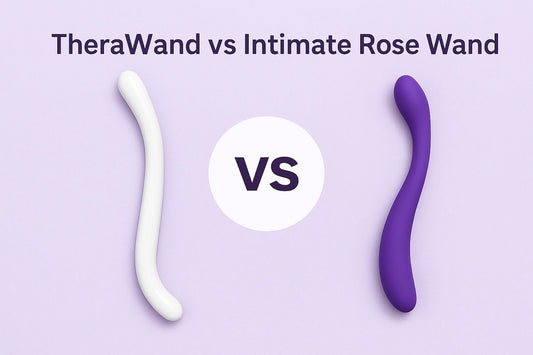Vaginal dilators are trusted pelvic health tools to relieve pelvic health conditions, including postpartum discomfort, vaginismus, dyspareunia, and symptoms of menopause. Admittedly, when the vagina is tender, even contemplating dilator therapy can feel overwhelming.
However, understanding how vaginal dilator brands differ, choosing vaginal dilators made from smooth medical-grade material, and ensuring dilator sets provide a gradual increment in sizes makes things less overwhelming and far more comfortable.
Based on personal and professional experience, we’ve outlined the differences below between the dilator sets from Intimate Rose and Blooms & Me. Read on to learn why the design, quality, and medical expertise behind Intimate Rose dilators clearly stand out above other brands.
What to Look for in a Set of Vaginal Dilators?
Several brands sell vaginal dilators, but not all are made with the same safety, material, design, expertise, or measurements. Therefore, understanding the science and medical know-how behind each design before purchasing a set of vaginal dilators can make all the difference for your healing journey.
FDA Clearance
FDA clearance is an important marker of safety and effectiveness for medical devices, including vaginal dilators. It means the product has undergone rigorous review to ensure it meets strict standards for quality, biocompatibility, and patient use, offering reassurance to both clinicians and patients. This distinction sets Intimate Rose dilators apart, as they are the only silicone vaginal dilators on the market to achieve FDA clearance. Their clearance not only reflects the company’s commitment to patient health and safety, but also positions them as a trusted choice for providers who want to recommend a product backed by evidence and regulatory validation.
Medical-Grade Material & Comfort
First and foremost, the material from which vaginal dilators are made is vitally important to prevent further irritation, pain, or discomfort. The vagina is an incredibly delicate part of the body; so vaginal dilators made from medical-grade materials are always advised over those that are not.
From my professional viewpoint, the best material for vaginal dilators is medical-grade silicone. In comparison to plastic, it’s much softer for the vagina, it’s easily cleaned with warm water and soap, and it doesn’t contain any grooves or crevices (like plastic) where bacteria can thrive.
Experience has also helped me determine that while some medical-grade silicone dilators feel soft, flexible, and comfortably life-like in the vagina, other dilators made with medical-grade silicone can feel rigid and hard like plastic.
This can depend on a few factors: the production formula produces a more rigid medical-grade silicone, the medical-grade silicone is mixed with another material during production, or the dilator’s shape is unforgiving and feels too stiff in the vagina.
From a comfort perspective, we’ve found that women prefer the softer and smoother version of medical-grade silicone to the hard and stiff version. It’s, therefore, worth investigating customer reviews on vaginal dilators before buying to gather feedback.
Progressively Increasing Sizes
Dilators that gradually progress in size (width and length) are also important. For example, when progressing to the next size dilator in a set, a big jump in diameter or length could end up being uncomfortable and set your healing journey back.
For this reason, pelvic physical therapists, who are trained to understand the nature of pelvic muscles and tissues, recommend a rise of no more than 1 cm in length for the smaller dilators in a set and no more than 1.5 cm for larger dilators. When it comes to diameter, an increase of 0.3-0.5 cm is recommended for smaller dilators, and an incremental difference of 0.5-0.8 cm for the larger dilators in a set.
Clinical Backing
Several brands promote their products as being clinically backed, but not all provide evidence that this is true. To confirm that vaginal dilators are clinically backed, check if a named medical professional is behind their design and whether a product has been proven safe and effective by other medical professionals in the same field.
For instance, clinically backed vaginal dilators are typically designed by a pelvic floor physical therapist due to their knowledge about the musculoskeletal system or a gynecologist with a similar understanding of the female anatomy. However, if other pelvic physical therapists or gynecologists fail to recommend them, the design, material, or measurements may not be ideal for healing.
Clinically backed vaginal dilators are also usually FDA-registered as a medical device. And if they’re considered one of the best on the market, you’ll likely find evidence that they’re used in official educational or training programs for upcoming experts in the field.
Support & Education
While some dilator brands provide educational support through blogs, instructional videos, and video call consulting, other brands offer no support after purchase. Due to the delicate nature of vaginal dilation and concerning the underlying conditions it aims to relieve, professional support, understanding, and instruction are paramount.
Do You Need a Full Set of Vaginal Dilators?
Since vaginal dilation is a gradual therapy, female health experts recommend that vaginal dilators should always be sold in sets of progressively increasing sizes for the most effective and comfortable results. However, what a ‘set’ entails can vary for each individual.
Although a ‘full set’ of vaginal dilators typically includes 8 dilators, some patients may only require the largest 4 dilators as their set, or the 4 smallest to begin with. Women experiencing vaginismus, where regular discomfort is evident when inserting a tampon, finger, or gynecological instrument during a routine pelvic exam, typically experience better results from a full set of 8 dilators.
On the other hand, postmenopausal women suffering from pain during sex due to vaginal dryness may only require the 4 largest dilators.
Essentially, each woman can have unique needs in relation to vaginal dilation therapy. The best way to understand whether you require a full set (8) or a half set of vaginal dilators (4) is to consult with a pelvic physical therapist or gynecologist. If it’s not something you feel comfortable discussing, start with the smallest dilator in a full set of 8 and work up from there.
Why Do We Recommend Intimate Rose Vaginal Dilators?
Intimate Rose vaginal dilators are made with velvety-smooth, medical-grade, BPA-free silicone that, according to users, feels soft and flexible enough in the vagina to be life-like yet firm enough to improve blood flow and elasticity.
Given that they are FDA-cleared and designed by a pelvic floor physical therapist who suffered her own pelvic health issues, it’s no surprise that the incremental size differences between dilators are also perfect. Ranging in length from 7.1 cm to 16.5 cm and in diameter from 1.1 cm to 3.8 cm, they comply with the recommended progressive increases.
Clinically, Intimate Rose dilators are not only recommended by pelvic physical therapists, doctors, and female health experts worldwide, but they are also used by the US Academy of Pelvic Health Physical Therapy in their courses that train physical therapists in pelvic floor health. In short, there is an outstanding amount of professional support and clinical backing for Intimate Rose vaginal dilators, not only in the US, but globally.
In support of their customers, Intimate Rose releases regular and free educational blogs on vaginal dilators and the conditions that underlie vaginal discomfort. They also provide updated instructional videos and offer online physical therapy consultations by request.
Price-wise, a full set of 8 dilators from Intimate Rose costs $159.99; however, sets of 4 are also available for the smallest 4 dilators ($79.99), medium-sized dilators ($89.99), and the 4 largest dilators ($99.99). For those on a budget, dilators can also be purchased individually, ranging from $16.99 for the smallest dilator to $44.99 for the largest.
The price point is a little higher than some brands and lower than others; however, in my professional experience, the extra dollars are well worth it for the best comfort, safety, design, and efficacy.
Blooms & Me Vaginal Dilators: How do They Compare to Intimate Rose?
Although Blooms & Me vaginal dilators may appeal to some budget-conscious shoppers due to their lower price (each set of 4 dilators is roughly $10 cheaper than Intimate Rose), several features of these dilators can do more harm than good to an already sensitive vagina.
While they are advertised as being made from medical-grade silicone, Blooms & Me dilators are considerably harder and more rigid in the vagina than Intimate Rose dilators. In contrast to the softer, life-like, and velvety smooth dilators from Intimate Rose, Blooms & Me tend to feel bulkier and less flexible. This can compromise patient comfort and the desire to continue through an entire set or session for effective relief.
Interestingly, the all-important progressive sizing of vaginal dilators is not disclosed on any product labels, packaging, or promotional material for Blooms & Me dilators. For instance, the official product description mentions only sizes 1-8, rather than detailed measurements and incremental increases in length and diameter.
Given that the precise incremental increases in length and diameter are fundamental to comfort, consistency, and continuity with dilator therapy, this omission of vital information is worrying, to say the least.
Concerning medical expertise, Blooms & Me vaginal dilators are designed and promoted by a gynecologist; however, no evidence of clinical backing exists. While researching this relatively new brand, we were unable to find professional endorsements from named pelvic physical therapists, doctors, or female health experts. We also failed to identify evidence that these dilators are used for any form of institutional training or have undergone clinical testing.
Educational support for customers is also limited, with only a small number of blogs from Blooms & Me, no instructional videos, and no facility to offer online one-to-one support. Due to the delicacy involved in vaginal dilation therapy, studies show that a lack of professional support can make all the difference between worsening symptoms and relieving them.
What Can You Expect from Using Vaginal Dilators?
After progressing slowly and mindfully through a set of vaginal dilators, women who previously experienced vaginal pain, tightness, discomfort, or vaginal dryness report feeling more relaxed in their daily lives and more sexually confident with their partners. Many also notice an increase in the production of natural vaginal lubrication.
In fact, vaginal dilation is so effective for restoring inflexible vaginal tissues and maintaining a pliable vaginal canal that most women continue using the largest dilator in their set to enjoy sexual activity well into their elderly years.
If you’re suffering from chronic pelvic floor pain, endometriosis, dyspareunia, interstitial cystitis, Mayer-Roitanski-Küster-Hauser Syndrome (MRKH), vaginismus, vaginitis, vulvodynia, vaginal stenosis, or have received pelvic radiation therapy, ask your gynecologist or physical therapist if vaginal dilators can provide comfort for you.
Conclusion
Although the shape of vaginal dilators may look similar on several websites, the design, material, comfort, and medical expertise can vary hugely between vaginal dilator brands.
Intimate Rose vaginal dilators, for instance, are designed by a pelvic floor physical therapist specialising in female health. They are made with velvety-smooth medical-grade silicone that feels comfortable and life-like in the vagina, yet firm enough to improve elasticity, and are recommended by health professionals and their patients worldwide. The incremental increase in dilator sizes also adheres to the recommended guidelines, and their educational support is second to none.
In comparison, Blooms & Me vaginal dilators are made from a more rigid medical-grade silicone that can feel bulky and rigid in the vagina. Strangely, no details of incremental increases between dilator sizes are disclosed, and although clinical recommendations are advertised, there is no evidence to support any backing from other health professionals.
If you’re looking to purchase a trusted, comfortable, and medically backed set of vaginal dilators, look no further than Intimate Rose.
References
The Pelvic Hub - Vaginal Dilator Uses - https://www.thepelvichub.com/blogs/ask-the-experts/vaginal-dilator-uses
Intimate Rose – What is Dyspareunia and How is it Treated? https://www.intimaterose.com/pages/what-is-dyspareunia-and-how-is-it-treated?
Intimate Rose – Endometriosis: Symptoms and Treatments for Pelvic Pain - https://www.intimaterose.com/blogs/pelvic-pain/endometriosis-symptoms-and-treatments-for-pelvic-pain?
National Library of Medicine - Compliance and clinical efficacy of vaginal dilator after radiotherapy for cervical and endometrial malignancies - https://www.ncbi.nlm.nih.gov/pmc/articles/PMC10292859/
Medicine Journal & Research Articles - Vaginal dilator use to promote sexual wellbeing after radiotherapy in gynecological cancer survivors- https://journals.lww.com/md-journal/Fulltext/2022/01280/Vaginal_dilator_use_to_promote_sexual_wellbeing.46.aspx
Young Women’s Health - MRKH: Instructions on the Use of Vaginal Dilators - https://youngwomenshealth.org/guides/vaginal-dilator-instructions/
National Institutes of Health - Vaginal Dilators: Issues and Answers - https://pubmed.ncbi.nlm.nih.gov/32014450/



